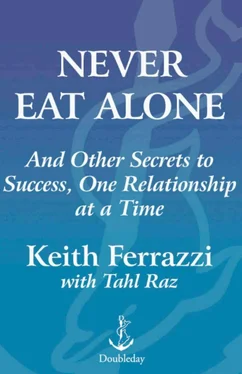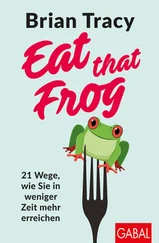Keith Ferrazzi - Never Eat Alone
Здесь есть возможность читать онлайн «Keith Ferrazzi - Never Eat Alone» весь текст электронной книги совершенно бесплатно (целиком полную версию без сокращений). В некоторых случаях можно слушать аудио, скачать через торрент в формате fb2 и присутствует краткое содержание. Год выпуска: 2005, ISBN: 2005, Издательство: C U R R E N C Y • D O U B L E D A Y, Жанр: marketing, на английском языке. Описание произведения, (предисловие) а так же отзывы посетителей доступны на портале библиотеки ЛибКат.
- Название:Never Eat Alone
- Автор:
- Издательство:C U R R E N C Y • D O U B L E D A Y
- Жанр:
- Год:2005
- ISBN:0-385-51529-4
- Рейтинг книги:4 / 5. Голосов: 1
-
Избранное:Добавить в избранное
- Отзывы:
-
Ваша оценка:
- 80
- 1
- 2
- 3
- 4
- 5
Never Eat Alone: краткое содержание, описание и аннотация
Предлагаем к чтению аннотацию, описание, краткое содержание или предисловие (зависит от того, что написал сам автор книги «Never Eat Alone»). Если вы не нашли необходимую информацию о книге — напишите в комментариях, мы постараемся отыскать её.
Never Eat Alone — читать онлайн бесплатно полную книгу (весь текст) целиком
Ниже представлен текст книги, разбитый по страницам. Система сохранения места последней прочитанной страницы, позволяет с удобством читать онлайн бесплатно книгу «Never Eat Alone», без необходимости каждый раз заново искать на чём Вы остановились. Поставьте закладку, и сможете в любой момент перейти на страницу, на которой закончили чтение.
Интервал:
Закладка:
Everyone from your family to your mailman is a portal to an entirely new set of folks.
So don't wait until you're out of a job, or on your own, to begin reaching out to others. You've got to create a community of colleagues and friends before you need it. Others around you are far more likely to help you if they already know and like you. Start gardening now. You won't believe the treasures to be found within your own backyard.
5. The Genius of Audacity
Seize this very minute; what you can do, or dream you can, begin it; Boldness has genius, power and magic in it.
— JOHANN WOLFGANG VON GOETHEMy father, Pete Ferrazzi, was a first-generation American, a Merchant Marine sailor in World War II, and an uneducated steelworker whose world was hard hours and low wages. He wanted more for me, his son. He and I were inseparable when I was growing up (his friends called me "re-Pete" because he took me everywhere with him). He knew I would have a better life if he could help me find a way out of our working-class heritage.
But my dad didn't know the exits. He'd never been to college. He knew nothing of country clubs or private schools. He could picture only one man who would have the sort of pull that could help me: his boss. Actually, the boss of his boss's boss's boss—Alex McKenna, CEO of Kennametal, in whose factory my dad worked.
The two men had never met. But Dad had a clear sense of how the world worked. He'd observed, even from the plant floor, that audacity was often the only thing that separated two equally talented men and their job titles. So he asked to speak with McKenna. McKenna, upon hearing the request, was so intrigued that he took the meeting. In the course of the meeting, he agreed to meet me—but nothing more.
It turned out that McKenna liked me—partly because of the way I had come to his attention. He served on the board of a local private elementary school, the Valley School of Ligonier, where all the wealthy families sent their children; by reputation it was one of the best elementary schools in the country. Strings were pulled, and Mr. McKenna got us an appointment with Peter Messer, the headmaster.
The day I enrolled in the Valley School, on scholarship, I entered a new world that set me on an entirely new course, just as my father had hoped. Over the next ten years, I got one of the best educations in America, starting with Valley School, then Kiski School, Yale University, and on to Harvard Business School. And it would never have happened if my father hadn't believed that it never hurts to ask.
As I look back on my career, it was the single most important act in my life. Moreover, the lesson I learned from my father's action, like no other, informed all that I have done since.
My father simply couldn't be embarrassed when it came to fulfilling his family's needs. I remember once we were driving down the road to our home when Dad spotted a broken Big Wheel tricycle in someone's trash. He stopped the car, picked it up, and knocked on the door of the home where the discarded toy lay waiting to be picked up.
"I spotted this Big Wheel in your trash," he told the owner. "Do you mind if I take it? I think I can fix it. It would make me feel wonderful to give my son something like this."
What guts! Can you imagine such a proud, working-class guy approaching that woman and, essentially, admitting he's so poor that he'd like to have her garbage?
Oh, but that's not the half of it. Imagine how that woman felt, having been given an opportunity to give such a gift to another person. It surely made her day.
"Of course," she gushed, explaining that her children were grown and that years had passed since the toy had been used.
"You're welcome to the bicycle I have, too. It's nice enough that I just couldn't throw it away..."
So we drove on. I had a "new" Big Wheel to ride and a bike to grow into. She had a smile and a fluttering heart that only benevolence breeds. And Dad had taught me that there is genius, even kindness, in being bold.
Every time I start to set limits to what I can and can't do, or fear starts to creep into my thinking, I remember that Big Wheel tricycle. I remind myself how people with a low tolerance for risk, whose behavior is guided by fear, have a low propensity for success.
The memories of those days have stuck with me. My father taught me that the worst anyone can say is no. If they choose not to give their time or their help, it's their loss.
Nothing in my life has created opportunity like a willingness to ask, whatever the situation. When I was just an anonymous attendee at the Davos Economic Forum in Switzerland, I walked onto a hotel bus and saw Nike founder Phil Knight. Knight was like a rock star to me, given his extraordinary success at creating and building Nike, and the many marketing innovations he introduced over the years. Was I nervous? You bet. But I jumped at the opportunity to speak with him, and made a beeline for the seat next to his. Later, he would become YaYa's first blue-chip customer. I do this sort of thing all the time, whatever the situation.
Sometimes I fail. I've got an equally long list of people I've attempted to befriend who weren't interested in my overtures. Audacity in networking has the same pitfalls and fears associated with dating—which I'm not nearly as good at as I am the business variety of meeting people.
Sticking to the people we already know is a tempting behavior. But unlike some forms of dating, a networker isn't looking to achieve only a single successful union. Creating an enriching circle of trusted relationships requires one to be out there, in the mix, all the time. To this day, every time I make a call or introduce myself to people I don't know, the fear that they might reject me is there. Then I remember the Big Wheel my father got me, and push ahead anyway.
Most of us don't find networking the least bit instinctive or natural. Of course, there are individuals whose inherent selfconfidence and social skills enable them to connect with ease.
Then there are the rest of us.
In the early days at YaYa, I was worried for the company's survival. For the first time in my career, I had to reach out to a lot of people I didn't know, representing an unknown company, pushing a product that was untested in the marketplace. It was uncomfortable. I didn't want to cold-call executives from BMW and MasterCard and pitch them my wares. But you know what? Pushing to get into BMW was not that difficult when the alternative was laying off a bunch of my staff or failing in the eyes of my board and investors.
Mustering the audacity to talk with people who don't know me often simply comes down to balancing the fear I have of embarrassment against the fear of failure and its repercussions. For my father, either he asked or his family didn't have. For me, I either ask or I'm not successful. That fear always overrides my anxiety about rejection or being embarrassed.
Ultimately, everyone has to ask himself or herself how they're going to fail. We all do, you know, so let's get that out of the way. The choice isn't between success and failure; it's between choosing risk and striving for greatness, or risking nothing and being certain of mediocrity.
For many people, the fear of meeting others is closely tied to the fear of public speaking (a fear that consistently beats out death as the one thing we dread most). Some of the world's most famous speakers admit to feeling similar anxiety. As Mark Twain said, "There are two types of speakers: those that are nervous and those that are liars."
The best way to deal with this anxiety is to first acknowledge that our fear is perfectly normal. You are not alone. The second thing is to recognize that getting over that fear is critical to your success. The third is to commit to getting better.
Читать дальшеИнтервал:
Закладка:
Похожие книги на «Never Eat Alone»
Представляем Вашему вниманию похожие книги на «Never Eat Alone» списком для выбора. Мы отобрали схожую по названию и смыслу литературу в надежде предоставить читателям больше вариантов отыскать новые, интересные, ещё непрочитанные произведения.
Обсуждение, отзывы о книге «Never Eat Alone» и просто собственные мнения читателей. Оставьте ваши комментарии, напишите, что Вы думаете о произведении, его смысле или главных героях. Укажите что конкретно понравилось, а что нет, и почему Вы так считаете.












